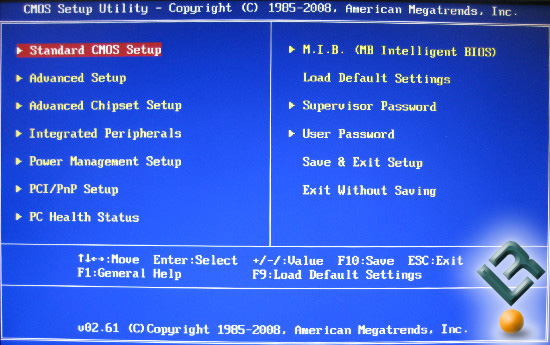ECS P45T-A Black Series Motherboard Review
Bundle and BIOS

The bundle that came with the EP45T-A contained your bare essentials. There were 3 SATA cables, a P-ATA cable, a support CD, punched backplate, manual, and hardware installation guide. Expect to scrounge around a bit in your parts bag if you need a floppy connector or a SATA power adapter.

ECS has chosen to use a modified American Megatrends BIOS. There’s your standard CMOS setup, Chipset options, PC Health, and a M.I.B. section that contains all the overclocking options.

Nothing to see here, just your standard date, time, and drive detections.

The Advanced Setup menu contains all your processor features along with the bootable device boot order.

The Advanced Chipset Setup contains nothing of importance and seems to be a holdover of older times.

The Integrated Peripherals lets you select the SATA controller mode between AHCI, IDE, and RAID. Control over the Ethernet and USB controllers also occurs here.

The Power Management menu lets you do precisely this, manage the power states of the board.

The PCI/PnP menu lets you select which video device the board will try to initialize first. This can be important in multi-monitor setups.

The PC Health area has a most unusual way of showing you the CPU temperature. Rather than simply state the CPU temperature, ECS has opted to show you the delta between the current temp and the TCC Activation temp. From what I can gather, this TCC temp is the maximum rated temperature for your processor, not exactly helpful when you have no clue what this temperature is.

This is the meat and potatoes of the BIOS and frankly the only screen that truly interested me. There is no adjustment of the CPU multiplier, FSB is adjustable from default FSB to 700MHz, PCIE is adjustable from 100MHz to 200MHz, and 1:1 and 5:4 dividers are available. Major memory timings can be adjusted once the SPD setting is disabled. The CPU voltage adjustments were most frustrating in that they don’t indicate actual voltages but additional voltages added to the default voltage. In my case, default voltage was 1.15v with a droop of .02v at idle for the CPU. Adding the maximum +.328mV gave me a paltry 1.45v, enough for air-cooling but immediately eliminating this board as a candidate for anything above 4500MHz with a Wolfdale. The DDR voltage drooped .05v from the BIOS voltages but thankfully was adjusted via usable values.

Comments are closed.